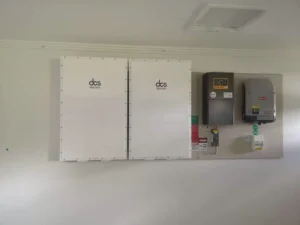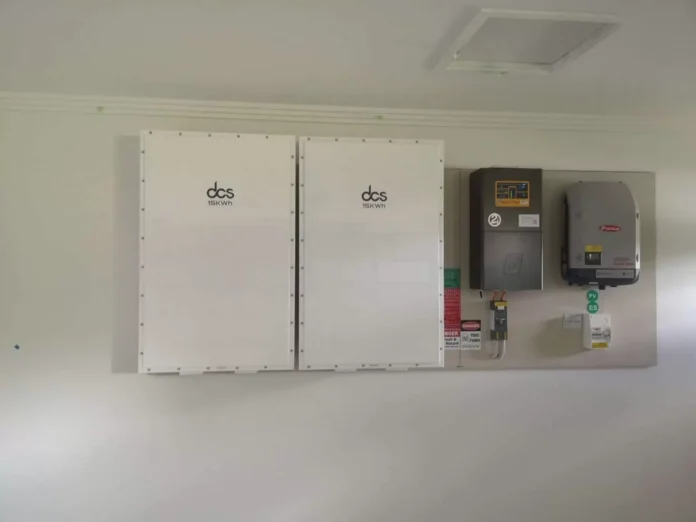As the world shifts towards more sustainable and renewable energy sources, the demand for solar energy systems has greatly increased. However, a crucial component of these systems, the batteries, often gets overlooked. Many people are not aware of the significant impact that using the right type of battery can have on the overall efficiency and lifespan of their solar energy system. This is where lithium ion solar batteries come in. These advanced and high-performance batteries have revolutionized the solar industry and are quickly becoming the preferred choice for solar energy storage.
Superior Energy Density and Efficiency
Lithium-Ion Solar Batteries distinguish themselves from traditional storage solutions through their remarkable energy density. This characteristic means they can hold a greater amount of energy in a more compact and lightweight form, setting them apart from bulkier alternatives like lead-acid batteries. The implications for solar energy systems are profound. With their ability to store more energy in a smaller footprint, Lithium-Ion batteries elevate the overall efficiency of solar setups.
This efficiency is not just about space saving; it’s also about the capacity to harness and utilize solar power more effectively. For homeowners or businesses employing solar panels, the high energy density of these batteries translates to a more robust and dependable source of power. Whether for daily use or as a backup during peak demand times, the increased energy storage capacity ensures that solar energy systems are more reliable and versatile.
This efficiency is particularly critical in maximizing the use of renewable energy sources, making Lithium-Ion Solar Batteries a pivotal component in the transition towards more sustainable energy practices. Their role in enhancing the performance and sustainability of solar energy systems underscores the importance of adopting advanced energy storage technologies that can meet the demands of the future.
Enhanced Longevity and Reliability
One of the standout features of Lithium-Ion Solar Batteries is their enhanced longevity and reliability, distinguishing them significantly from alternatives like lead-acid batteries. These batteries are engineered to endure more charge and discharge cycles before experiencing a drop in capacity, making them a long-term investment for any solar energy system. The extended lifecycle of Lithium-Ion batteries means that replacements are less frequent, providing a more cost-effective solution over time.
This durability is attributed to the batteries’ ability to maintain their performance levels even under varied environmental conditions, thereby ensuring that your solar energy system remains operational and efficient year after year. Moreover, the reliability of these batteries is underpinned by their consistent power output, which does not diminish rapidly with use.
This consistent performance is crucial for systems that require a dependable source of energy without the risk of sudden power drops or failures. Additionally, the robust nature of Lithium-Ion batteries contributes to fewer maintenance demands, allowing for a more seamless integration into solar energy systems without the constant need for oversight or intervention. This aspect of Lithium-Ion Solar Batteries not only simplifies the operational aspect of solar energy storage but also reinforces the system’s reliability over its lifespan.
 Fast Charging Capabilities
Fast Charging Capabilities
A key benefit of Lithium-Ion Solar Batteries lies in their ability to accept charge at a rapid pace. Unlike their lead-acid counterparts, these batteries can efficiently convert solar energy to stored power in significantly less time. This rapid charging feature is particularly advantageous for solar energy systems, ensuring that energy accumulation is swift and effective, even during brief periods of strong sunlight.
For users, this means less worry about whether their battery storage will be adequate after only a few hours of sunlight, making it easier to maintain power availability for daily needs or unexpected usage spikes. Additionally, the fast charging capability aligns perfectly with the unpredictable nature of solar energy availability, allowing systems to quickly capitalize on sunlight when it’s available. This efficiency not only optimizes the use of renewable energy but also enhances the overall user experience by providing a more reliable and responsive energy storage solution.
The ability to quickly recharge also plays a critical role during consecutive days of poor weather, where brief sunny intervals can still significantly contribute to the energy reserves. This feature underscores the adaptability and practicality of Lithium-Ion Solar Batteries in varying climates and conditions, further solidifying their position as a superior choice for modern solar energy systems.
Reduced Maintenance and Safety Features
Lithium-Ion Solar Batteries set themselves apart with their minimal maintenance requirements. Unlike alternatives that necessitate regular attention like watering and equalization to maintain their health and efficiency, these batteries are almost maintenance-free. This reduction in upkeep not only streamlines the operation of solar energy systems but also cuts down on the time and resources that would otherwise be dedicated to battery care.
Moreover, these batteries are engineered with advanced safety mechanisms designed to mitigate risks. Overcharging and overheating, common concerns with battery technologies, are addressed through built-in features that automatically regulate the battery’s temperature and charge levels. This proactive approach to safety minimizes the potential for hazardous situations, offering peace of mind to users while ensuring the seamless function of their solar energy setup.
Additionally, the sophisticated management systems within Lithium-Ion Solar Batteries closely monitor performance and health indicators, further enhancing their safe operation. These attributes collectively reduce the demands placed on users for battery supervision, making Lithium-Ion Solar Batteries a preferred option for those seeking a reliable, efficient, and safe energy storage solution.
The Role of Solar Battery Bank
At the heart of an efficient solar energy system lies the solar battery bank, a critical component that ensures the seamless utilization of solar power generated by your panels. Lithium-Ion Solar Batteries, in particular, revolutionize the way energy is stored and used, making them a cornerstone of any effective solar bank. The role these batteries play cannot be overstated; they are the repository that captures excess solar energy, allowing for its use when sunlight is not available.
Imagine a sunny day where your solar panels work at their peak, generating more energy than you currently need. Without a robust solar bank, this surplus energy would go to waste or, in grid-tied systems, sold back to the grid often at a rate lower than what you would pay to buy it back during high-demand periods. By incorporating Lithium-Ion Solar Batteries into your solar bank, you’re equipped to store this excess energy efficiently.
This storage capability ensures that you have a steady, reliable energy supply available at all times, regardless of weather conditions or time of day. It’s especially useful during evenings, cloudy days, or peak energy usage times when the demand on your system is highest. The energy stored in these batteries can also provide critical backup power during outages, maintaining the operation of essential appliances and systems in your home or business.
Environmental Impact and Sustainability
The shift towards Lithium-Ion Solar Batteries reflects a growing commitment to environmental stewardship and sustainable energy solutions. These batteries play a crucial role in reducing greenhouse gas emissions by enabling more efficient use of renewable solar energy. Unlike their lead-acid counterparts, which often entail a heavier environmental footprint due to their shorter lifespans and the need for more frequent replacements, Lithium-Ion batteries boast a longer operational life. This extended lifespan means less waste and reduced demand for resource-intensive manufacturing processes over time.
Moreover, the high energy efficiency of Lithium-Ion Solar Batteries contributes to a decrease in energy loss during storage and conversion, further curtailing the overall carbon footprint of solar energy systems. Their ability to store more energy in a smaller space also leads to less resource usage for battery production, aligning with principles of resource conservation and minimal environmental impact.
Compatibility with Various Solar Systems
Lithium-Ion Solar Batteries exhibit an unparalleled level of compatibility across a broad spectrum of solar energy configurations, making them a versatile choice for any solar application. Their flexible nature allows for seamless integration into both off-grid setups, where independence from the utility grid is paramount, and grid-tied systems, which benefit from the ability to store excess energy or draw from the grid as needed. This adaptability is particularly advantageous for users looking to customize their solar energy solutions to meet specific requirements or constraints.
Their design is such that they can easily fit into various system sizes and types, from residential to commercial scale installations. For homeowners aiming to achieve energy self-sufficiency or businesses looking to reduce operational costs through renewable energy, Lithium-Ion Solar Batteries provide a reliable and efficient storage solution. Their compatibility extends to hybrid systems as well, where solar energy is used in conjunction with other renewable sources, further emphasizing their role in diverse energy applications.
Expanding Applications and Versatility
The use of Lithium-Ion Solar Batteries has grown to encompass a diverse range of applications, underscoring their adaptability and high performance. Beyond their traditional role in solar energy storage, these batteries are increasingly found in electric vehicles (EVs), powering a shift towards cleaner transportation options. Their high energy density and rapid charging capabilities make them ideal for EVs, offering longer driving ranges and shorter charging times compared to other battery technologies.
In the realm of portable electronics, Lithium-Ion Solar Batteries are revolutionizing the way we use and charge our devices. From smartphones and laptops to portable power banks, these batteries ensure that our devices stay powered for longer periods, enhancing convenience and user experience. Their lightweight and compact nature also make them perfect for inclusion in smaller, portable gadgets, eliminating the bulk and weight associated with other types of batteries.
In more remote or off-grid locations, where traditional energy sources are either too costly or unavailable, Lithium-Ion Solar Batteries are providing reliable and efficient power solutions. These batteries are being used to store solar energy in off-grid solar systems, delivering electricity to remote communities, research stations, and outdoor adventure bases.
FAQS
Q: Can Lithium-Ion Solar Batteries Withstand Extreme Temperatures?
A: Lithium-Ion Solar Batteries are designed to operate efficiently across a broad range of temperatures. However, extreme cold or heat can impact their performance to some degree. It’s important to follow manufacturer guidelines for temperature ranges to ensure optimal operation.
Q: What Maintenance Is Required For Lithium-Ion Solar Batteries?
A: One of the key advantages of Lithium-Ion Solar Batteries is their minimal maintenance requirements. Unlike other battery types, they do not require regular watering, equalization, or specific gravity checks. Routine monitoring of the battery’s state of charge and ensuring they are kept within recommended operational parameters suffices.
Q: How Do Lithium Ion Solar Batteries Impact The Environment?
A: Lithium-Ion Solar Batteries support environmental sustainability by enabling more efficient use of renewable solar energy, reducing greenhouse gas emissions. Advances in recycling processes for these batteries are also helping to minimize their environmental footprint by ensuring the valuable materials they contain can be reclaimed and reused.
Conclusion
Lithium Ion Solar Batteries stand at the forefront of solar energy storage, providing a myriad of advantages that significantly boost the efficacy and reliability of solar power systems. Their unmatched energy density ensures a compact, yet powerful storage solution, allowing for greater energy capture and utilization. This feature, coupled with their rapid charging abilities, ensures that solar systems can quickly adapt to fluctuating energy demands and avail themselves of limited sunlight efficiently.
| Other Good Articles to Read |
| blogs rain |
| Cme Blog Spot |
| Garcias Blogs |
| Yyc Blogs |
| Guiade Blogs |
| Blogs-Hunt |
| Impact-Blog |
| Smarty Blogs |
| Ed Blog |
| Mo Blogs |
| Blogs Em |
| blogs t |
| Related Business Listings |
| Contact Directory |
| Local Business Profiles |

